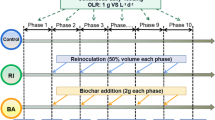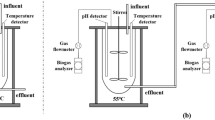Abstract
The anaerobic digestion (AD) of food waste (FW) was augmented with ammonia-tolerant anaerobic sludge (ATAS). Different inoculum substrate ratios (ISR) under an initial ammonia stress of 4220 mg N/L were investigated. Results showed that the average specific methane production (SMP) of FW in the ATAS system increased by 36% compared with that in un-acclimated anaerobic sludge. SMP with ISR of 1:2.5 increased by approximately 6 times. Volatile fatty acids (VFAs) accumulation and sharp pH decline were not detected. These results revealed the high performance of ATAS in simultaneously relieving ammonia and acid stress. This improvement was attributed to multiple factors. ATAS had high ammonia tolerance and ability in conversion of acetate into methane. The equilibrium of NH3/NH4+, CO2/H2CO3/HCO3−, and CxHyCOOH/CxHyCOO− could promote VFAs and ammonia ionization, reduce the levels of free VFAs and ammonia, neutralize pH, and thus enhance the system’s buffering capacity to be less susceptible to fluctuations. These results demonstrated that employing ATAS in improving AD performance and resilience from acid and ammonia inhibition is feasible and effective.








Similar content being viewed by others
Data availability
All data generated or analyzed during this study are included in this published article and its supplementary information files.
References
APHA (2012) Standard methods for the examination of water and wastewater, 22nd, American Public Health Association,Washington, DC, USA
Bardi MJ, Aminirad H (2020) Synergistic effects of co-trace elements on anaerobic co-digestion of food waste and sewage sludge at high organic load. Environ Sci Pollut Res 27(15):18129–18144. https://doi.org/10.1007/s11356-020-08252-y
Braguglia CM, Gallipoli A, Gianico A, Pagliaccia P (2018) Anaerobic bioconversion of food waste into energy: a critical review. Bioresour Technol 248(Pt A):37–56. https://doi.org/10.1016/j.biortech.2017.06.145
Cai JF, Pan AD, Li YL, **ao YY, Zhou Y, Chen CJ, Sun FQ, Su XM (2021) A novel strategy for enhancing anaerobic biodegradation of an anthraquinone dye reactive blue 19 with resuscitation-promoting factors. Chemosphere 263:127922. https://doi.org/10.1016/j.chemosphere.2020.127922
Chen SJ, Tao ZLT, Yao FB, Wu B, He L, Hou KJ, Pi ZJ, Fu J, Yin HY, Huang Q, Liu YJ, Wang DB, Li XM, Yang Q (2020) Enhanced anaerobic co-digestion of waste activated sludge and food waste by sulfidated microscale zerovalent iron: insights in direct interspecies electron transfer mechanism. Bioresour Technol 316:123901. https://doi.org/10.1016/j.biortech.2020.123901
Demirel B, Scherer P (2008) The roles of acetotrophic and hydrogenotrophic methanogens during anaerobic conversion of biomass to methane: a review. Rev Environ Sci Biotechnol 7:173–190. https://doi.org/10.1007/s11157-008-9131-1
Fotidis IA, Karakashev D, Angelidaki I (2013a) Bioaugmentation with an acetate-oxidising consortium as a tool to tackle ammonia inhibition of anaerobic digestion. Bioresour Technol 146:57–62. https://doi.org/10.1016/j.biortech.2013.07.041
Fotidis IA, Karakashev D, Kotsopoulos TA, Martzopoulos GG, Angelidaki I (2013b) Effect of ammonium and acetate on methanogenic pathway and methanogenic community composition. FEMS Microbiol Ecol 83(1):38–48. https://doi.org/10.1111/j.1574-6941.2012.01456.x
Fotidis IA, Karakashev D, Angelidaki I (2014a) The dominant acetate degradation pathway/methanogenic composition in full-scale anaerobic digesters operating under different ammonia levels. Int J Environ Sci Technol 11(7):2087–2094. https://doi.org/10.1007/s13762-013-0407-9
Fotidis IA, Wang H, Fiedel NR, Luo G, Karakashev DB, Angelidaki I (2014b) Bioaugmentation as a solution to increase methane production from an ammonia-rich substrate. Environ Sci Technol 48(13):7669–7676. https://doi.org/10.1021/es5017075
Gao SM, Huang Y, Yang LL, Wang H, Zhao MX, Xu ZY, Huang ZX, Ruan WQ (2015a) Evaluation the anaerobic digestion performance of solid residual kitchen waste by NaHCO3 buffering. Energy Convers Manag 93:166–174. https://doi.org/10.1016/j.enconman.2015.01.010
Gao SM, Zhao MX, Chen Y, Yu MJ, Ruan WQ (2015b) Tolerance response to in situ ammonia stress in a pilot-scale anaerobic digestion reactor for alleviating ammonia inhibition. Bioresour Technol 198:372–379. https://doi.org/10.1016/j.biortech.2015.09.044
Gnaoui YE, Karouach F, Bakraoui M, Bzrz M, Bari HE (2020) Mesophilic anaerobic digestion of food waste: mesophilic anaerobic digestion fo food waste: effect of thermal pretreatment on improvement of anaerobic digestion process. Energy Rep 6(Suppl 2):417–422. https://doi.org/10.1016/j.egyr.2019.11.096
Koch K, Lubken M, Gehring T, Wichern M, Horn H (2010) Biogas from grass silage-measurements and modeling with ADM1. Bioresour Technol 101(21):8158–8165. https://doi.org/10.1016/j.biortech.2010.06.009
Kuang Y, Zhao JW, Gao Y, Lu CG, Luo SY, Sun YJ, Zhanget DL (2020) Enhanced hydrogen production from food waste dark fermentation by potassium ferrate pretreatment. Environ Sci Pollut Res 27(15):18145–18156. https://doi.org/10.1007/s11356-020-08207-3
Lauterbock B, Ortner M, Haider R, Fuchs W (2012) Counteracting ammonia inhibition in anaerobic digestion by removal with a hollow fiber membrane contactor. Water Res 46(15):4861–4869. https://doi.org/10.1016/j.watres.2012.05.022
Li LH, Kong XY, Yang FY, Li D, Yuan ZH, Sun YM (2012) Biogas production potential and kinetics of microwave and conventional thermal pretreatment of grass. Appl Biochem Biotechnol 166(5):1183–1191. https://doi.org/10.1007/s12010-011-9503-9
Li L, Peng XY, Wang XM, Wu D (2018) Anaerobic digestion of food waste: a review focusing on process stability. Bioresour Technol 248(Pt A):20–28. https://doi.org/10.1016/j.biortech.2017.07.012
Loizia P, Neofytou N, Zorpas AA (2018) The concept of circular economy strategy in food waste management for the optimization of energy production through anaerobic digestion. Environ Sci Pollut Res 26(15):14766–14773. https://doi.org/10.1007/s11356-018-3519-4
Meng XS, Yu DW, Wei YS, Zhang YX, Zhang QF, Wang ZY, Liu JB, Wang YW (2018) Endogenous ternary pH buffer system with ammonia-carbonates-VFAs in high solid anaerobic digestion of swine manure: an alternative for alleviating ammonia inhibition? Process Biochem 69:144–152. https://doi.org/10.1016/j.procbio.2018.03.015
Pelletier E, Kreimeyer A, Bocs S, Rouy Z, Gyapay G, Chouari R, Rivière D, Ganesan A, Daegelen P, Sghir A, Cohen GN, Medigue C, Weissenbach J, Paslier DL (2008) “Candidatus Cloacamonas Acidaminovorans”: genome sequence reconstruction provides a first glimpse of a new bacterial division. J Bacteriol 190(7):2572–2579. https://doi.org/10.1128/JB.01248-07
Rajagopal R, Masse DI, Singh G (2013) A critical review on inhibition of anaerobic digestion process by excess ammonia. Bioresour Technol 143:632–641. https://doi.org/10.1016/j.biortech.2013.06.030
Ren YY, Yu M, Wu CF, Wang QH, Gao M, Huang QQ, Liu Y (2018) A comprehensive review on food waste anaerobic digestion: research updates and tendencies. Bioresour Technol 247:1069–1076. https://doi.org/10.1016/j.biortech.2017.09.109
Rico C, Montes JA, Lobo A (2020) Dry batch anaerobic digestion of food waste in a box-type reactor system: inoculum preparation and reactor performance. J Clean Prod 251:119751. https://doi.org/10.1016/j.jclepro.2019.119751
Sun CH, **a A, Fu Q, Huang Y, Lin RC, Murphy JD (2019) Effects of pre-treatment and biological acidification on fermentative hydrogen and methane co-production. Energy Convers Manag 185:431–441. https://doi.org/10.1016/j.enconman.2019.01.118
Ulgudur N, Demirer GN (2019) Anaerobic treatability and residual biogas potential of the effluent stream of anaerobic digestion processes. Water Environ Res 91(3):259–268. https://doi.org/10.1002/wer.1048
Wang QH, Yang YN, Li DW, Feng CP, Zhang ZY (2012) Treatment of ammonium-rich swine waste in modified porphyritic andesite fixed-bed anaerobic bioreactor. Bioresour Technol 111:70–75. https://doi.org/10.1016/j.biortech.2012.01.182
Westerholm M, Leven L, Schnurer A (2012) Bioaugmentation of syntrophic acetate-oxidizing culture in biogas reactors exposed to increasing levels of ammonia. Appl Environ Microbiol 78(21):7619–7625. https://doi.org/10.1128/AEM.01637-12
Yang ZY, Wang W, He YF, Zhang RH, Liu GQ (2018) Effect of ammonia on methane production, methanogenesis pathway, microbial community and reactor performance under mesophilic and thermophilic conditions. Renew Energy 125:915–925. https://doi.org/10.1016/j.renene.2018.03.032
Yang Q, Wu B, Yao FB, He L, Chen F, Ma YH, Shu XY, Hou KJ, Wang DB, Li XM (2019) Biogas production from anaerobic co-digestion of waste activated sludge: co-substrates and influencing parameters. Rev Environ Sci Biotechnol 18(4):771–793. https://doi.org/10.1007/s11157-019-09515-y
Yenigün O, Demirel B (2013) Ammonia inhibition in anaerobic digestion: a review. Process Biochem 48(5-6):901–911. https://doi.org/10.1016/j.procbio.2013.04.012
Yuan HP, Zhu NW (2016) Progress in inhibition mechanisms and process control of intermediates and by-products in sewage sludge anaerobic digestion. Renew Sust Energ Rev 58:429–438. https://doi.org/10.1016/j.rser.2015.12.261
Zhang B, He PJ (2014) Performance assessment of two-stage anaerobic digestion of kitchen wastes. Environ Technol 35(10):1277–1285. https://doi.org/10.1080/09593330.2013.866169
Zhang L, Lim EY, Loh KC, Ok YS, Lee JTE, Shen Y, Wang C, Dai YJ, Tong YW (2020) Biochar enhanced thermophilic anaerobic digestion of food waste: focusing on biochar particle size, microbial community analysis and pilot-scale application. Energy Convers Manag 209:112654. https://doi.org/10.1016/j.enconman.2020.112654
Zhao MX, Ruan WQ (2013) Biogas performance from co-digestion of Taihu algae and kitchen wastes. Energy Convers Manag 75:21–24. https://doi.org/10.1016/j.enconman.2013.05.037
Zhao XF, Li L, Wu D, **ao TH, Ma Y, Peng XY (2019) Modified anaerobic digestion model no. 1 for modeling methane production from food waste in batch and semi-continuous anaerobic digestions. Bioresour Technol 271:109–117. https://doi.org/10.1016/j.biortech.2018.09.091
Acknowledgments
The authors would like to thank the National Natural Science Foundation of China, the Natural Science Foundation of Zhejiang Province, the Jiangsu Key Laboratory of Anaerobic Biotechnology (Jiangnan University), and the people who have participated in the research on the anaerobic digestion of food waste for biogas production.
Funding
This research was supported by Zhejiang Provincial Natural Science Foundation of China under Grant No. LQ17E080013; the National Natural Science Foundation of China (31971385, 51678279); the open Foundation of Jiangsu Key Laboratory of Anaerobic Biotechnology (JKLAB201707); and the National Key Research and Development Project (2019YFC1906300).
Author information
Authors and Affiliations
Contributions
SG was a major contributor in writing the manuscript. WR and MZ contributed to the study conception and design. Material preparation, data collection, and analysis were performed by SG and XL. All authors read and approved the final manuscript.
Corresponding author
Ethics declarations
Conflict of interests
The authors declare that they have no competing interests.
Additional information
Responsible Editor: Ta Yeong Wu
Publisher’s note
Springer Nature remains neutral with regard to jurisdictional claims in published maps and institutional affiliations.
Rights and permissions
About this article
Cite this article
Gao, S., Lei, X., Ruan, W. et al. Synergetic enhancement of methane production and system resilience during anaerobic digestion of food waste in ammonia-tolerant anaerobic sludge system. Environ Sci Pollut Res 28, 21851–21861 (2021). https://doi.org/10.1007/s11356-020-11861-2
Received:
Accepted:
Published:
Issue Date:
DOI: https://doi.org/10.1007/s11356-020-11861-2




